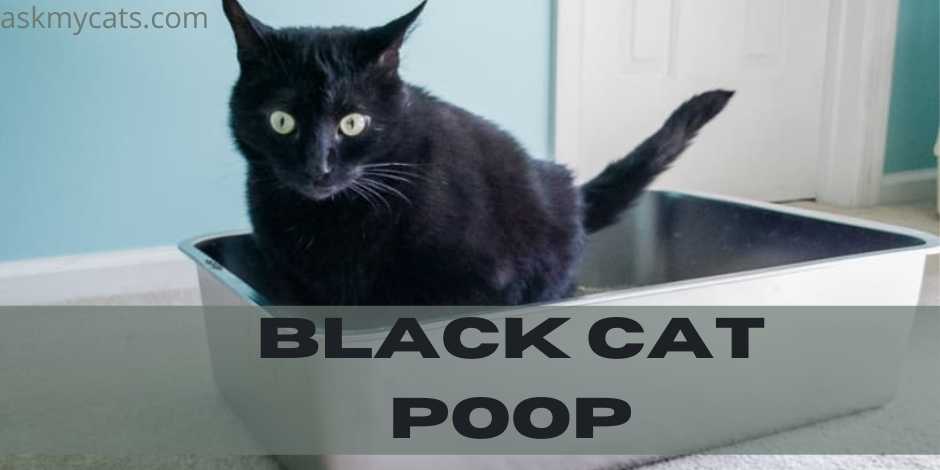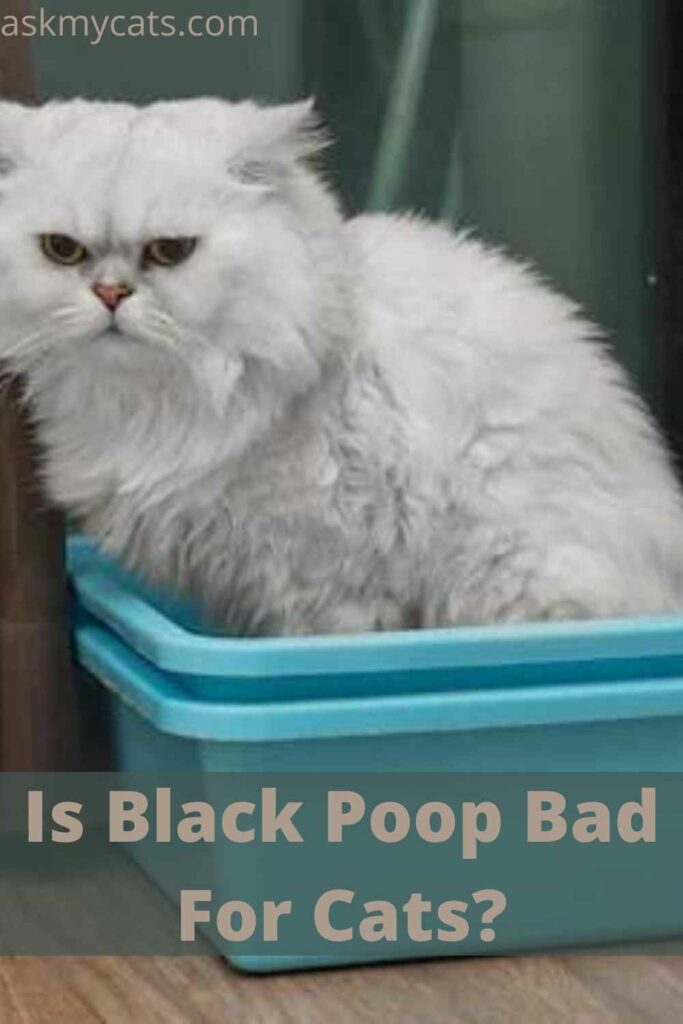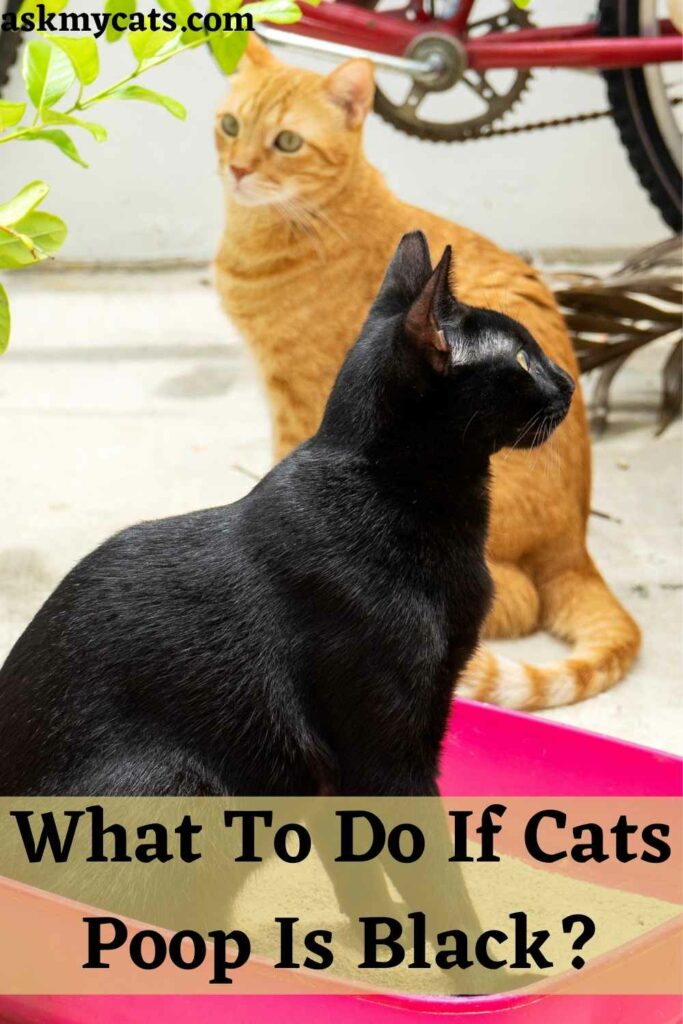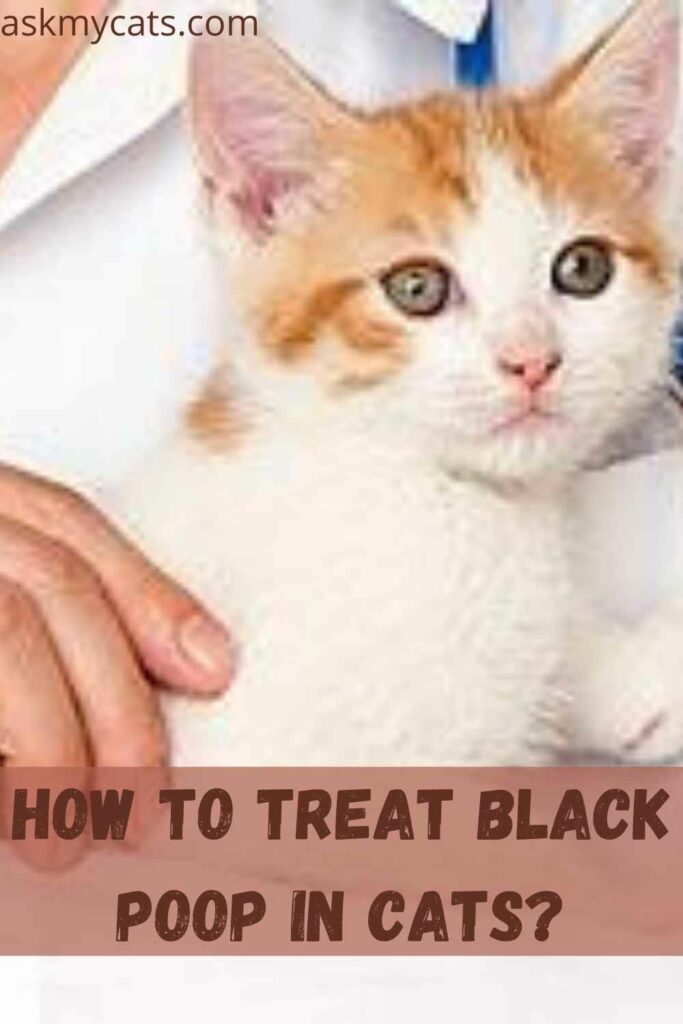Cleaning the litter box may not be one of your favorite activities as a cat parent. One of the most important things you can do to keep your kitty companion healthy is to check their excrement for regular color and shape.
Cat excrement is a good sign of your kitty’s health because most cats poop at least once a day. It can inform you whether they have a blockage or an underlying sickness or if their cat food is causing them problems.
So, what does black cat poop means?
Black cat poop means that your cat has digested blood. This generally happens when your cat has bleeding in the stomach or small intestines. This kind of stool is from higher up in the intestine, such as the stomach or small intestine. This type of bleeding can be caused by ulcers, parasites, foreign bodies, food allergies, and viruses.
Keep reading this article to know the dangers of black cat poop and how you can treat it.


Give Your Cat the Perfect Day
Get the Free Ebook!
Why Is My Cat’s Poop Black?
Your cat’s poop may be black as she might have melena.
Melena is a term used to describe a black, tarry-looking stool usually caused by bleeding in the upper gastrointestinal tract.
It has also been observed in cats once a considerable volume of blood has been absorbed from the oral cavity or respiratory system.
Melena is a sign of some underlying disease, not a disease in and of itself.
The oxidation of iron in hemoglobin (the oxygen-carrying pigment of red blood cells) causes the blood to turn dark as it goes through the small intestine and colon.
If you see Grey or Orange poop, then you must read out this article.
Is Black Poop Bad For Cats?
Yes, black poop is bad for cats as it can be a sign of your cat having some underlying disease.

Bleeding in the upper gastrointestinal tract, such as from the mouth, stomach, or small intestines is indicated by black cat feces.
The presence of blood in the poo, especially if it is slick and sticky like road tar, suggests that the blood has been digested.
Internal bleeding is a severe health risk, and if your cat produces black poo, you should take them to your local Greencross Vets right once.
Blood in the stool in cats is a condition in which your cat’s stool contains varying amounts of blood.
Hematochezia, which looks like bright red blood, and black, tarry blood are the two types of blood found in the stool.
Blood in the stool is usually a sign of a more severe problem.
Blood in the stool might be a sign of a dangerous underlying infection or illness, or it can be the result of a common and mild condition.
While blood in the stool is not necessarily an emergency, you should seek veterinarian attention for your cat if it persists for longer than a few days or occurs frequently.
Yellow Cat Poop??? Read out here.!
What Does Black Poop Mean In Cats?
Black poop means that your cat has a condition known as melena.
Although the almost-black gunk coating your cat’s stool may not scream “blood,” it does indicate that something has changed.
This suggests that you’re dealing with the upper GI tract: the stomach, or small intestine, and it’s caused by digested blood. Melena is the name given to this type of blood.
Bloody stools in cats can occur for a variety of reasons. If you pay attention to the litter box, you can tell whether the condition is light or serious.
So, while your cat may be perplexed as to why you’re examining their feces, you’re actually doing them a favor.
Make sure to check your cat’s hind end first if you find a few droplets of new blood. It’s possible that the blood isn’t coming from their GI system at all.
Instead, look for injuries or abscesses surrounding the rectum. These will need to be taken care of by a veterinarian.
If your cat’s poop is WHITE, check this out.!
What To Do If Cats Poop Is Black?
If your cat’s poop is black, the first thing you must do is visit your vet and get her diagnosed.

Most of the time cat’s black poop means she is having melena.
You’ll need to provide a detailed history of your cat’s health, including the beginning of symptoms and any incidences that may have contributed to this disease.
Your veterinarian may be able to figure out where the blood is coming from based on the information you offer.
Your pet’s doctor will perform a thorough physical examination after taking a detailed medical history.
A complete blood count (CBC), biochemistry profile, and urinalysis are all common laboratory tests.
The underlying cause of the issue will determine the outcome of these tests.
Anemia with smaller (microcytic) and paler red blood cells than normal (hypochromic) red blood cells may be discovered through blood testing.
Anemia is frequently nonregenerative in cases of chronic blood loss, meaning the bone marrow does not typically respond to the body’s increased demand for red blood cells.
Anemia is primarily regenerative in acute cases, as the bone marrow responds to the body’s growing needs by producing new red blood cells.
Other anomalies include a decrease in the number of platelets (blood-clotting cells), an increase in the number of neutrophils (neutrophilia), and a decrease in the number of both red and white blood cells.
Besides intestinal causes of melena, such as those of the kidney and liver, a biochemistry profile may reveal abnormalities connected to a sick state.
Urinalysis may detect blood in the urine, which is typical in cats who have blood coagulation problems.
Abdominal x-rays will be obtained to check for any masses, swallowed foreign bodies, and abnormalities in the size and shape of the kidneys and liver.
X-rays of the lungs and esophagus, which are also a common underlying cause of melena, can be identified with thoracic (chest) x-rays.
Internal imaging with ultrasounds is also common, and more detailed images of the abdominal cavity and gastrointestinal tract are routinely obtained.
Ultrasound can detect tumors, liver illness, pancreas inflammation, and renal disease.
An endoscope, a flexible tube put down into the stomach through the esophagus for direct imaging of masses and ulcers in the esophagus, stomach, and intestines, is another diagnostic tool that your veterinarian is likely to use employ.
Endoscopy also aids in the collection of biopsy samples for tissue analysis and the removal of any foreign bodies that may be present.
You must read this if you see Green cat poop.
How To Treat Black Poop In Cats?
The primary goal of treating black poop in cats is to treat the underlying disease, including diseases of the kidney, liver, and lungs.

The problem of black poop should be resolved after successful treatment.
Fluid therapy will be administered to replenish lost fluids in the body, and a whole blood transfusion may be required in some individuals with severe blood loss and anemia.
Cats who have been vomiting nonstop will need medication to manage the vomiting and help them keep their food long enough for it to digest.
Surgery may be required in the case of serious ulcers or tumors in the gastrointestinal tract.
While seeing blood will make your heart race and make you feel anxious, there are some therapy methods you can try at home.
You don’t need to rush to the ER just yet if your cat is acting properly, eating regularly, and not vomiting.
After all, stress can create inflammation in your cat’s GI tract, causing it to wobble. Inadvertent ingestion of a new meal can also cause problems. So it’s not unreasonable to test a few home remedies and see how they work.
Some of the home remedies are: –
1. Hydrate Your Cat
Your cat’s body is wanting moisture if they have diarrhea or are constipated. It will be beneficial to provide as much water as possible.
Set out additional water bowls, invest in a water fountain, or convert from dry to canned food. Most cats don’t get enough fluid in their daily diet, so giving them a little extra helps a lot.
2. Dietary assistance
Your cat may require a GI reset from time to time. The bloody stools you’re witnessing are a sign of systemic inflammation.
An over-the-counter probiotic can assist in removing undesirable bacterial overgrowth and re-establishing beneficial flora. The majority of cat probiotics are included in canned foods, and cats often enjoy the taste.
A teaspoon of pumpkin added to your cat’s food will supply the fiber their digestive system requires.
Cats are carnivores, but they don’t mind a little fruit now and then. Just leave out the pumpkin pie filling: The GI distress will be exacerbated by those spices.
3. Rest
Examine any recent changes in the household as well. Have there been any bloody stools in the litter box since the new addition?
Have you noticed any other indicators of stress in your cat? To help your kitty’s system wind down, you may need to provide some relaxing time.
Medical Treatment includes: –
- Discontinue all oral drinks and food for the time being, especially if the cat is vomiting. This permits the GI tract to rest, which may aid in healing the GI tract’s lining. If the clinical indications have decreased, a gradual reintroduction of tiny amounts of bland food can be started.
- Some cats with melena may require subcutaneous or intravenous fluid and electrolyte therapy to rectify dehydration, acid-base, and electrolyte imbalances.
- If the patient becomes anemic as a result of the melena, blood transfusions may be required.
- Patients with coagulopathies may benefit from plasma transfusions and vitamin K therapy.
- Drugs like Tagamet® (cimetidine) and Zantac® (ranitidine) that reduce stomach acid production may speed up the resolution of melena, especially if gastrointestinal ulcers cause it.
- Protectants and adsorbents (which bind hazardous chemicals) for the gastrointestinal tract may be considered. Sucralfate (Carafate®) is one of the potential protective agents to try. Bismuth-containing protectants should be avoided because they tend to tint the feces black, making it harder to tell if the melena has resolved.
- Surgical intervention is sometimes necessary, especially when a bleeding ulcer, gastrointestinal tumor, foreign body, or stomach/intestine malpositioning is discovered.
Frequently Asked Questions
Why is my cat straining while pooping?
Straining to poop can be a sign of constipation. Small, hard, dry feces or lengthier, thin feces are two forms of poo your cat could pass, both of which could indicate constipation. Constipation can be caused by a variety of factors, including hairballs from excessive grooming, nutrition, dehydration, or gastrointestinal disorders. Although straining to poop can be an indication of constipation, it’s vital to make sure this symptom isn’t misinterpreted as a sign of anything else. ‘It may look that your cat is having problems defecating, but they are actually having trouble urinating,’ Experts explain. ‘This is far more frequent than constipation, particularly among males.’ Older cats, too, may have trouble passing stools as their bowels lose tone and the capacity to “wring out” the feces – a condition known as megacolon.’
Is hair common in cat’s poop?
Yes, hair is pretty common in cats’ poop. You may occasionally detect strange-looking items in your cat’s excrement, such as bone and twine, as well as wood. It’s estimated that 80 to 90% of foreign bodies pass through the intestine without causing problems. They can, however, occasionally produce an obstruction. Hair in your cat’s poo isn’t a cause for concern because, when not regurgitated as a furball, the hair they ingest from grooming goes through their system and exits with their feces. Little white particles that resemble rice grains, on the other hand, are frequently tapeworm remains and should be investigated by your veterinarian.
What does it imply when my cat poos blood but has no other symptoms?
Remember that cats are skilled at hiding signs of disease, so just because there aren’t any other evident signs doesn’t mean you should disregard the blood in their feces. Don’t wait for further symptoms to arise; the presence of blood is enough to trigger a visit to the veterinarian. Even if the cause is minor and not cause for alarm, it’s always better to be safe than sorry.
Final Words
Don’t panic if you find your cat’s poop to be black. Contact your vet immediately for a diagnostic. The source of the blood usually determines treatment for bloody stools.
If no acute disease is diagnosed, your veterinarian may offer GI support drugs and vitamins. This could entail taking probiotics for a period of time. A change in diet may also be required.
Once the underlying condition is treated, the majority of cats will recover. The overall prognosis will be determined by diagnosing and treating the underlying disease or condition, as melena is only a symptom.

The pumpkin pie filling – the symptoms will be exacerbated by those spices means symptoms will be made worse. Is that what you meant to say?
yes